
Parent Conference Forms for Teachers: Complete Guide & Templates 2026
Parent conference forms for teachers are essential tools that streamline and structure meaningful discussions about student progress. These comprehensive forms guide productive conversations between educators and parents, covering academic performance, behavioral observations, and developmental milestones. By providing a structured framework, these forms ensure that every parent-teacher conference is focused, productive, and results in clear action plans for student success.
1. What Are the Essential Components of Parent Conference Forms in 2026
1.1 Basic student information
The form should start with basic student details such as:
- Name
- Grade/Class
- Teacher’s Name
- Date of Conference
This information helps ensure that the form is correctly linked to the student and is useful for future reference.
1.2 Academic performance
This section focuses on the student’s academic achievements, challenges, and strengths. It may include the following:
- Overall academic progress: A summary of how the student is performing in key subjects.
- Strengths: Specific subjects or skills where the student excels.
- Areas for improvement: Subjects or skills where the student needs additional support or development.
- Homework and classwork: Comments on the student’s engagement and completion of homework and in-class activities.
- Standardized test scores (if applicable): Feedback on any recent assessments, such as test scores or grades, and their implications for learning.
1.3 Social and behavioral development
An important part of the conference form is evaluating the student’s social and behavioral skills. This section could include:
- Behavior in class: Observations of how the student behaves in the classroom environment (e.g., participation, attentiveness, respectfulness).
- Interactions with peers: Notes on how the student interacts with classmates (e.g., teamwork, friendships, conflicts).
- Classroom conduct: An evaluation of whether the student follows classroom rules and routines.
- Attitude and motivation: An assessment of the student’s attitude toward learning and school.
1.4 Communication and support
Effective communication is key in maintaining a strong teacher-parent relationship. This section can include:
- Teacher’s observations: Specific examples of how the student engages in class, any concerns, or any positive changes the teacher has noticed.
- Parent’s observations: A space where parents can share their insights, concerns, and observations about their child’s performance at home.
- Suggestions for improvement: Recommendations from the teacher on ways parents can support their child’s academic growth, including study tips, extra activities, or behavior strategies.
Discover Related Guides: Why Is It Important to Build Relationships with Students? A Complete Guide

1.5 Goal setting and action plan
Setting clear goals is crucial for both parents and teachers. This section should outline:
- Short-Term goals: Specific, achievable objectives that the student should focus on in the near future.
- Long-Term goals: Broader goals for the academic year or beyond, depending on the student’s progress.
- Action plan: Steps both the teacher and parents can take to help the student achieve these goals. This may include additional support at home, tutoring, or interventions at school.
1.6 Parent and teacher comments
The final section should offer space for both the teacher and parents to add additional comments or questions that were not covered earlier in the form. This section provides an opportunity for both parties to express any additional thoughts or concerns.
2. How Can Teachers Create Effective Parent Conference Forms Step-by-Step?
While many schools provide a standard form for parent-teacher conferences, it’s important to make sure the form is tailored to the specific needs of the classroom or the student. Here are a few tips for creating an effective parent conference form:
2.1 Keep it simple and clear
The form should be easy to read and not overly complicated. Use clear, simple language to describe areas of concern and progress. Avoid jargon that parents may not understand. Bullet points, headings, and short sentences will make it easier to fill out and review during the conference.
2.2 Make it personal
While a standardized format is useful, it’s important to make the form personalized to each student. Include specific examples and details that reflect the individual student’s progress, strengths, and areas for improvement. Personalization shows parents that their child’s unique needs are being considered.
2.3 Use positive language
Even when addressing areas for improvement, use positive language to keep the tone constructive. For example, instead of saying “needs to improve in math,” say “can benefit from additional practice in math.” This helps create an environment of growth and possibility.
2.4 Allow space for parent input
Leave room for parents to add their thoughts, concerns, and feedback. This encourages open communication and makes the conference more of a two-way dialogue. Parents are more likely to feel engaged in the process if they have a say in their child’s development.
2.5 Provide actionable next steps
Instead of just pointing out areas of improvement, make sure to include specific action items or steps both the teacher and parents can take to support the student. Clear, actionable steps will help guide the next phase of the student’s educational journey.
Explore More: How to Deal with Defiant Students in the Classroom
3. Where Can Teachers Find Sample Parent Conference Forms by Grade Level?
Elementary school

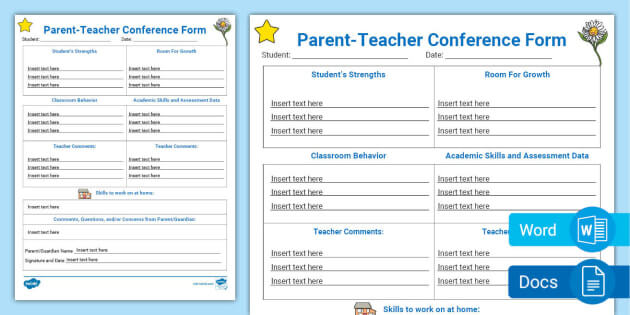
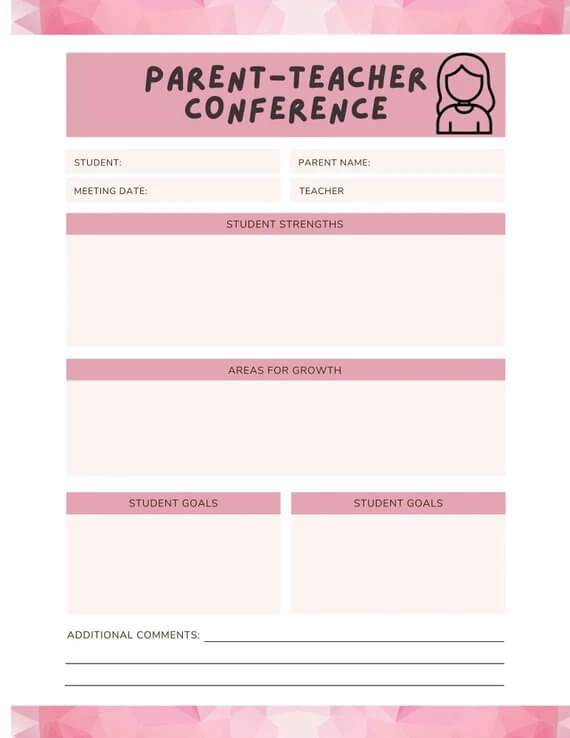
Middle school
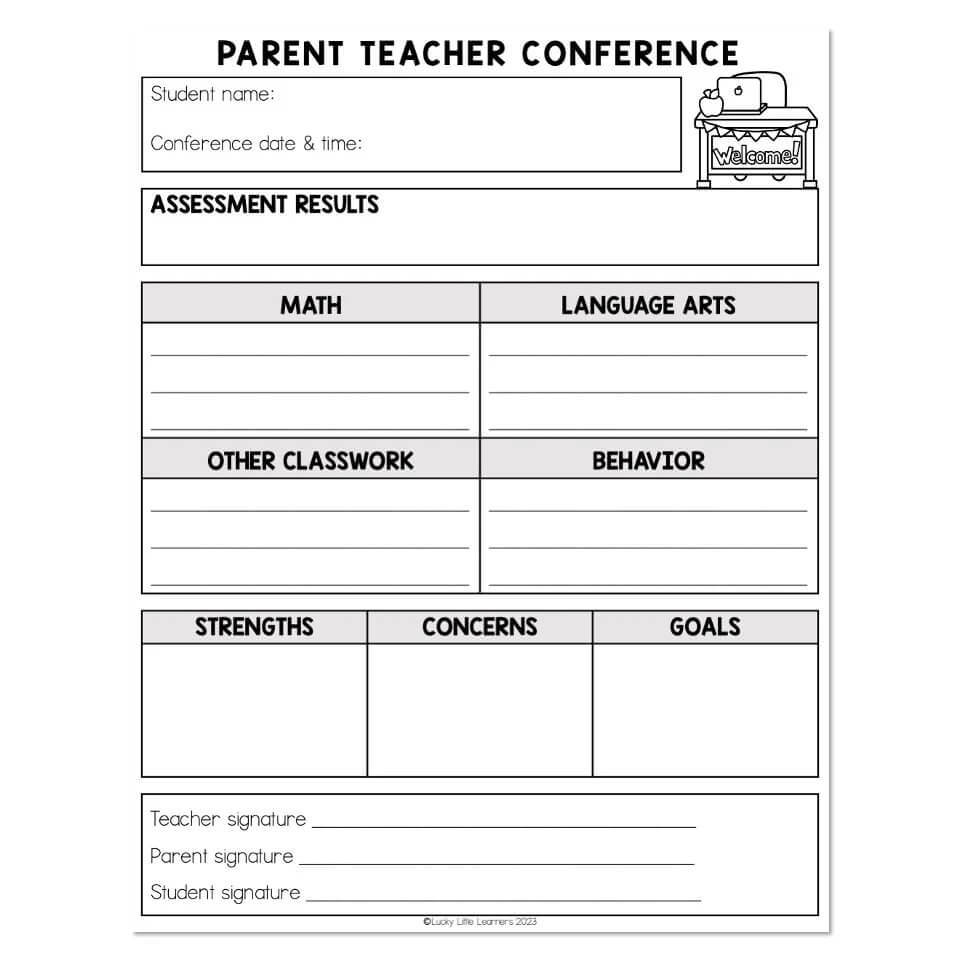
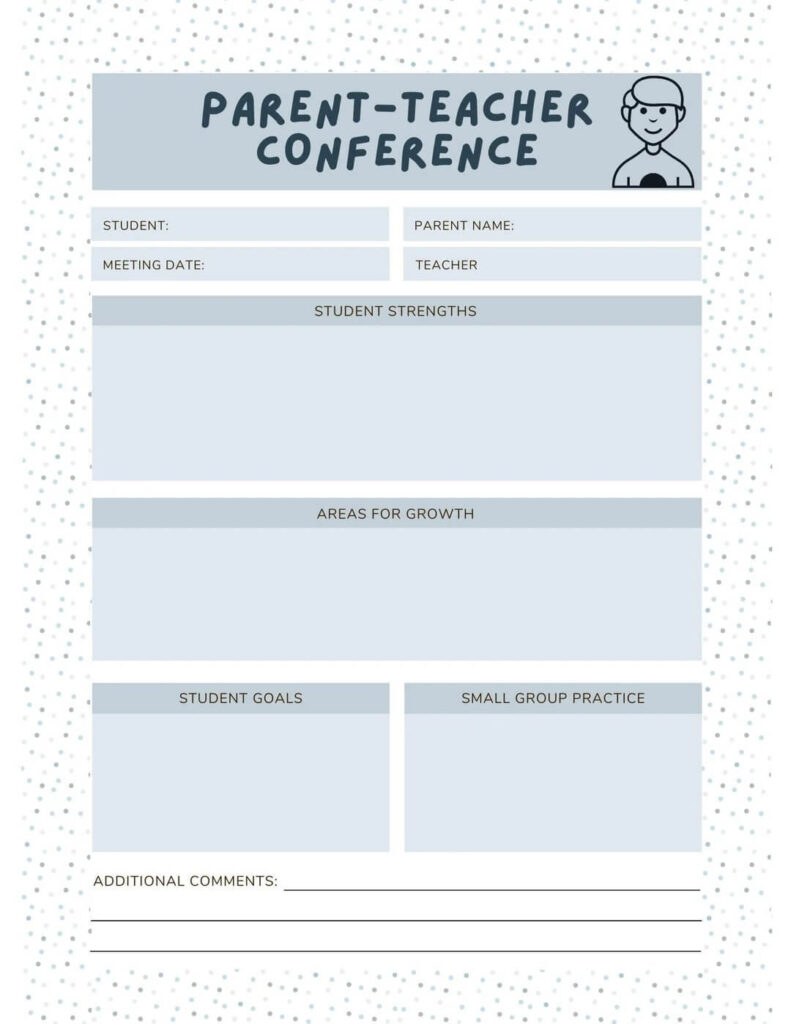
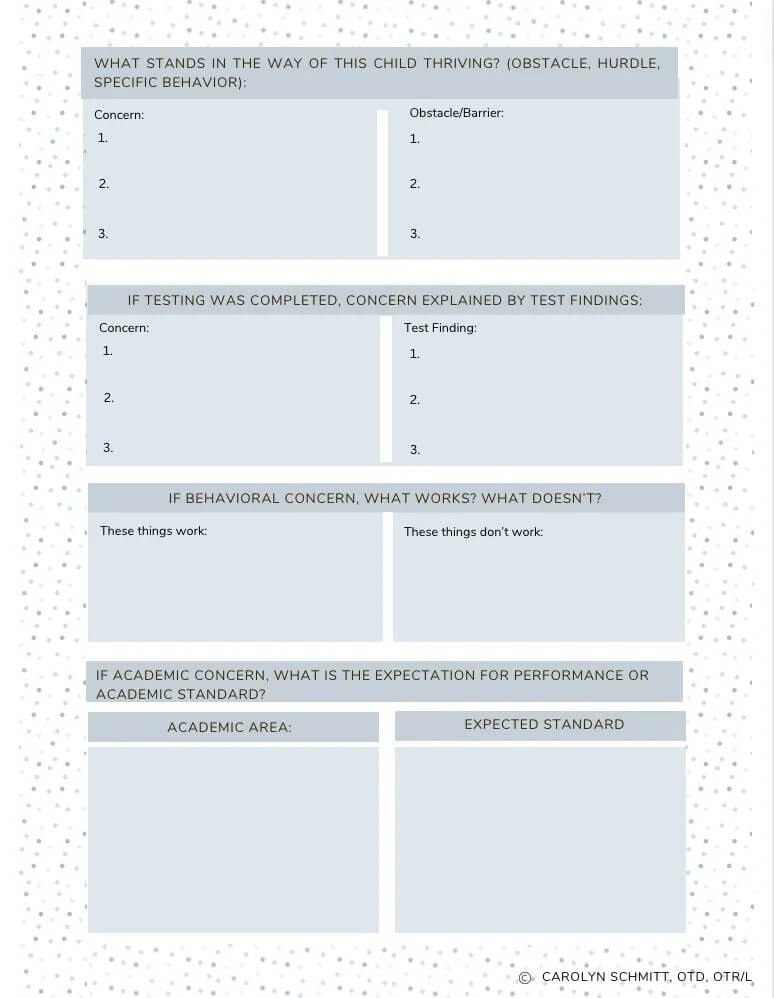
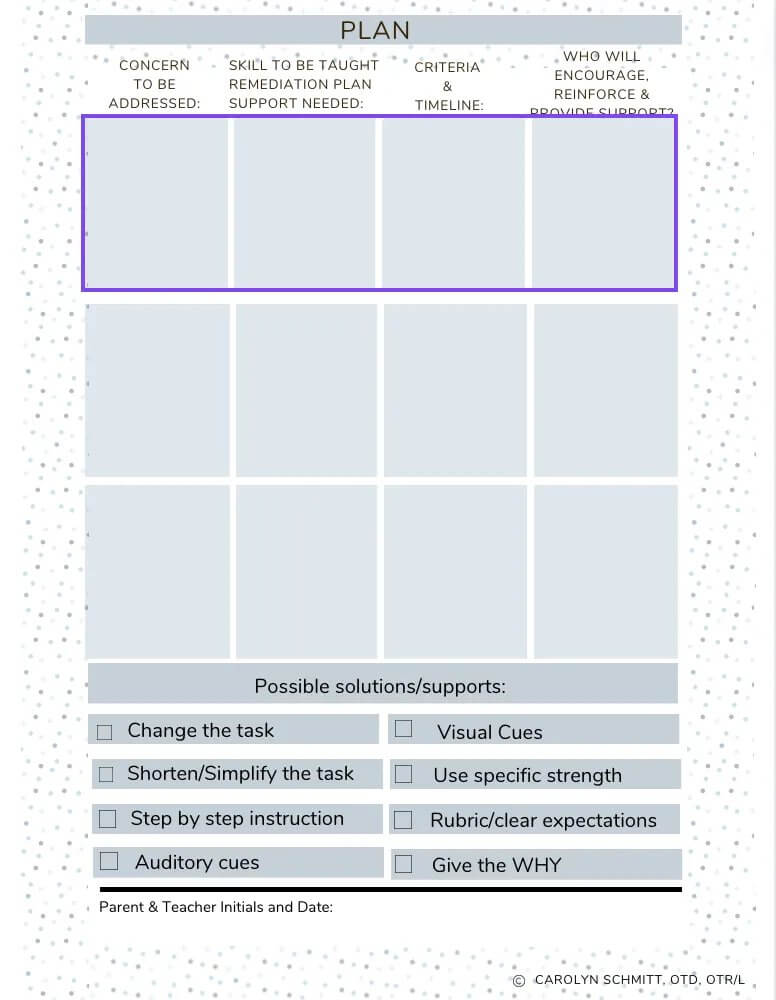
High school
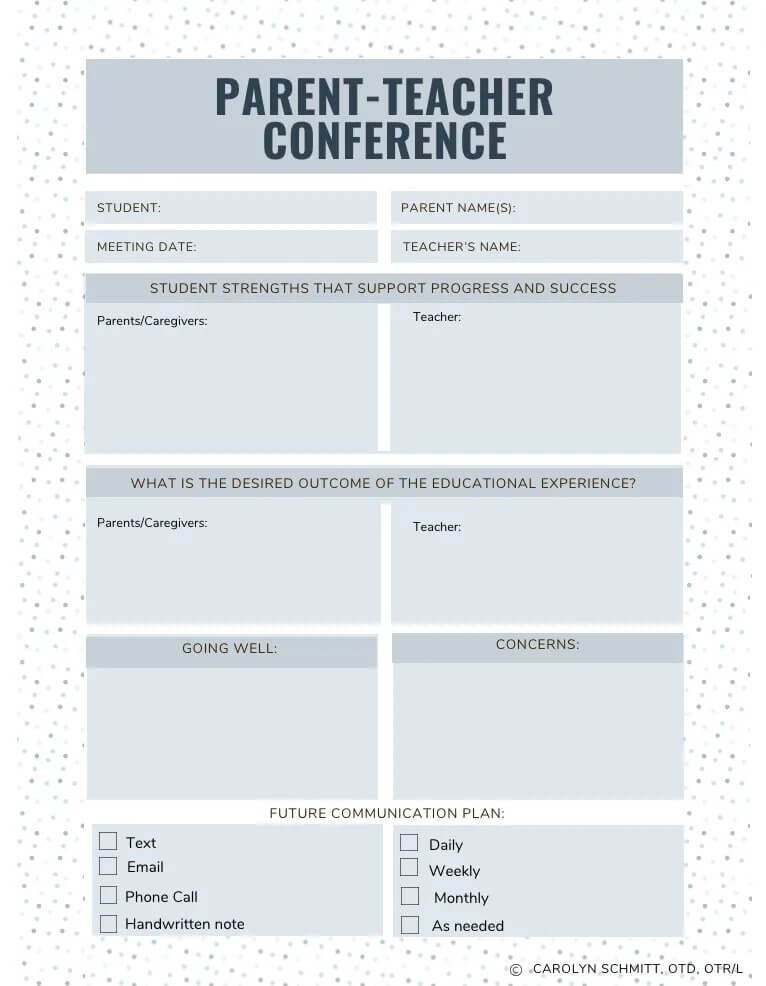
Common Questions About Parent Conference Forms
Simple parent teacher conference form
A simple parent-teacher conference form is a short and easy form that helps teachers and parents talk about how a student is doing in school. It has basic information like the student’s name and grade, and it talks about things like how the student is doing in their subjects, how they behave in class, and what they need to work on. This form helps everyone focus on the most important things during the meeting.
Parent teacher conference form elementary
A parent-teacher conference form for elementary school usually includes:
- The student’s name, grade, and teacher.
- How the student is doing in subjects like math, reading, and writing.
- How the student behaves in class and gets along with other kids.
- The teacher’s thoughts on the student’s progress or any concerns.
- A place where parents can share what they think or ask questions.
- Ideas on how parents can help their child improve at home.
Parent teacher conference form high school
A parent-teacher conference form for high school is a little more detailed and usually includes:
- The student’s name, grade, and the teacher’s name.
- A look at how the student is doing in each subject, like test scores and classwork.
- Comments on how the student behaves in class and how often they come to school.
- Notes on how the student is preparing for college or a future job.
- Short-term and long-term goals the student is working on.
- A place for parents to add any comments or questions they have about their child’s progress.
These forms help teachers and parents work together to make sure the student is on the right path for success in school and beyond.
Discover Related Guides: What to Write in Teacher Appreciation Cards: Complete Guide 2026
In conclusion, parent conference forms for teachers play a crucial role in fostering strong communication between educators and families. By providing a structured way to discuss a student’s strengths, challenges, and achievements, these forms ensure that everyone involved is working together to support the student’s growth. Using these forms effectively can help create a more positive and productive environment for both students and teachers.






